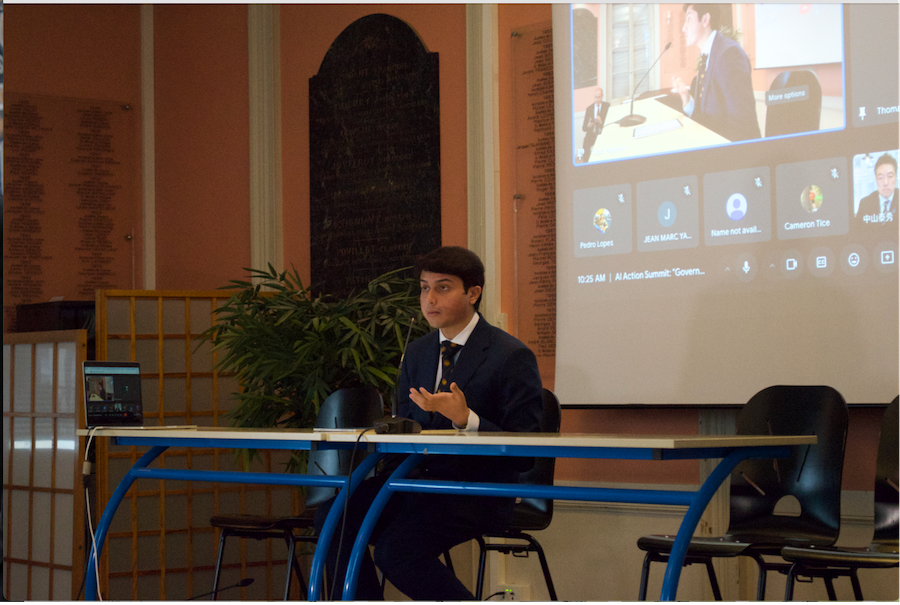Speech of Sarosh Nagar, Enlightenment in Action Alliance’s Member
Thank you all for coming today. My name is Sarosh Nagar. I am a Marshall Scholar and researcher at University College London (UCL). I am very excited today to summarize the high-level contributions of the young people of the Enlightenment in Action Alliance (EAA) as part of the broader Creating a New Paris of Enlightenment report by the Boston Global Forum (BGF). Before I begin, I would like to thank the leadership of the Forum for this opportunity and to France for hosting such a wonderful event.
The Boston Global Forum established the Enlightenment in Action Alliance to support President Macron and France by bringing talented students from top universities to contribute to France and the global AI community. As part of the Alliance, over the past few weeks, the Boston Global Forum’s Youth Delegates proposed several ways that France can harness the benefits of AI for good. These proposals were reviewed by the Boston Global Forum’s Board, which includes world-renowned experts from industry, policy, and academia–many of whom are here today. The Board selected several proposals for inclusion in the final report, which Boston Global Forum CEO Mr. Tuan will present to President Macron tomorrow.
In turn, the contributions of the youth delegates in our report fall into five key areas, which I will briefly summarize below.
- First, our report proposes ways that France can harness AI for scientific research while enhancing data governance. AI has immense scientific applications, as seen with diffusion-based generative models that aid in protein structure prediction. Therefore, our report proposes launching a Cloud Laboratory, a type of laboratory that would utilize AI and robotics to enable automated large-scale experiments in biotechnology and materials science. In similar vein, our report also focuses on data governance. Effectively curated data can greatly enhance AI systems’ computational efficiency while representative data is important to ensure AI systems remain inclusive. Therefore, our report proposes France launch a Data Library, which would be a high-quality repository of public datasets compliant with the highest ethical and privacy standards. These public datasets, many of which would focus on low-resource languages, could later be used to train more advanced AI models and ensure frontier model capabilities remain inclusive.
- Second, our report proposes ways for France to harness AI for social and economic development. Several estimates suggest AI will add over $10 trillion to the global economy by 2030, but it is important that AI’s benefits are widely accessible. Therefore, this report proposes initiatives utilizing AI for rural communities, harnessing large multimodal models in use cases like agriculture. The report also proposes launching a global initiative to upskill the workforce for AI, including launching apprenticeships, AI-driven vocational training, and more.
- Third, our report proposes ways that France can utilize AI to enhance cultural preservation and public discourse. Being in France, a nation with a rich cultural and civic tradition, it is incumbent on us to analyze how AI can further enhance this fabric of our societies. In this spirit, the report proposes launching an AI-based cultural heritage preservation program, utilizing AI, virtual reality (VR), and augmented reality (AR) to digitally reconstruct cultural sites. The report calls for launching programs to help educate existing government, industry, and academic professionals on AI ethics. Finally, it also calls for an AI-driven public discourse platform to enable lively debate among citizens and promote democratic engagement.
- Fourth, our report proposes ways that France and other governments can harness AI for national and global security. Initial analyses suggest that AI is an offense-favored technology, which creates a vital question of how to enhance defensive use cases of AI. Therefore, our report proposes creating a national AI “cyber-shield,” a program of advanced AI agents for real-time cybersecurity monitoring and zero-day vulnerability detection, alongside programs to help ethical hackers and red-teamers secure these systems. Our report also proposes launching an AI-powered crisis response network, to harness advanced frontier models for disaster prediction, response coordination, and more — to defensively save lives from future global threats.
- Fifth and lastly, our report proposes ways that France and other governments can harness AI to improve policymaking. In line with the spirit of this session, AI-enabled governance has immense transformative potential to speed up public service delivery and bureaucratic processes. Therefore, our report proposes that France launch programs to utilize frontier models to aid in the forecasting of legislation or using agents and other AI systems to streamline public-sector processes. The report also suggests focusing more research on building more energetically-efficient AI systems and identifying ways AI can support environmental monitoring. Lastly, our report also proposes ways to use machine learning algorithms to launch an automated national job matching tool to help promote high levels of employment.
This report, which will be available for review in further detail in the future, could not have been done without the aid of a large list of youth collaborators, with special recognition to Tuan Vinh, Cameron Sabet, Jason Shin, Dang Nguyen, Berke Altiparmak, Sammer Marzouk, and others for their contributions. We hope that, through these youth contributions to the “Creating a New Paris of Enlightenment” report, France will, much as it did in the past, lead a new era of Enlightenment that combines technological innovation with ethical governance for a better future.
